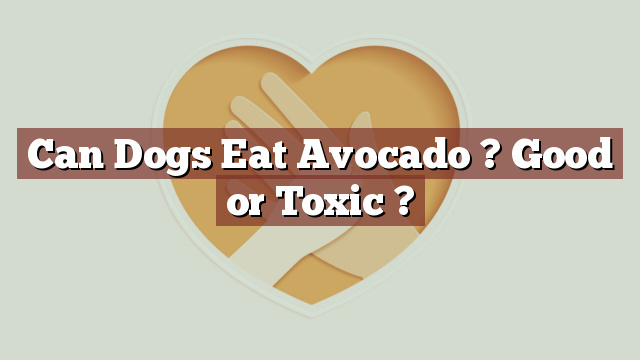Can Dogs Eat Avocado? Good or Toxic?
Avocado is a popular and nutritious fruit that is consumed by many people around the world. As responsible pet owners, it is essential to be aware of which foods are safe and suitable for our furry companions. So, can dogs eat avocado? Let’s delve into the topic and shed light on the potential risks and benefits of feeding avocado to our canine friends.
Nutritional Value of Avocado for Dogs
Avocados are known for their high nutritional value, packed with healthy fats, vitamins, and minerals. They are an excellent source of vitamins C, E, and B6, as well as folate and potassium. Additionally, avocados contain monounsaturated fats, which are beneficial for heart health.
Can Dogs Eat Avocado? Safety and Toxicity
The answer is no, dogs should not eat avocado. While avocados offer numerous health benefits for humans, they can be potentially toxic to dogs. Avocado contains a substance called persin, which is harmless to humans but can be toxic to dogs when consumed in large quantities. Persin is primarily found in the leaves, bark, and seed of the avocado fruit, but it can also be present in the flesh to a lesser extent.
Although persin toxicity in dogs is relatively rare, it is better to err on the side of caution and avoid feeding avocados to our canine companions altogether. Consuming large amounts of avocado can lead to various health issues in dogs, including diarrhea, vomiting, stomach upset, and pancreatitis.
Potential Risks and Benefits for Dogs Consuming Avocado
While the risks of feeding avocado to dogs outweigh the potential benefits, it is worth mentioning that some dog foods and treats may include small amounts of avocado as an ingredient. These commercial products typically use avocado in a processed and controlled manner, eliminating the toxic parts and ensuring the safety of the final product.
However, it is crucial to consult with a veterinarian before introducing any avocado-based products to your dog’s diet. A professional can determine the appropriate quantity and form of avocado that may be safe for your furry friend.
What to Do If Your Dog Eats Avocado
If you suspect that your dog has consumed avocado, it is essential to monitor their behavior and health closely. If your dog shows any signs of gastrointestinal distress, such as vomiting or diarrhea, it is best to contact your veterinarian immediately.
In most cases, the symptoms associated with avocado consumption in dogs are mild and resolve on their own. However, if your dog ingests a large amount of avocado or experiences severe symptoms, prompt veterinary care should be sought.
Conclusion: Considerations for Feeding Avocado to Dogs
In conclusion, it is not recommended to feed avocados to dogs due to the potential risks associated with persin toxicity. While avocados offer numerous health benefits for humans, they can have adverse effects on our four-legged friends. It is crucial to prioritize the wellbeing and safety of our pets by avoiding foods that could potentially harm them.
If you are looking for alternative ways to provide a well-balanced and nutritious diet for your dog, consult with your veterinarian for suitable options. Always remember that the health and happiness of our canine companions should be our utmost priority.
Thank you for investing your time in exploring [page_title] on Can-Eat.org. Our goal is to provide readers like you with thorough and reliable information about various dietary topics. Each article, including [page_title], stems from diligent research and a passion for understanding the nuances of our food choices. We believe that knowledge is a vital step towards making informed and healthy decisions. However, while "[page_title]" sheds light on its specific topic, it's crucial to remember that everyone's body reacts differently to foods and dietary changes. What might be beneficial for one person could have different effects on another. Before you consider integrating suggestions or insights from "[page_title]" into your diet, it's always wise to consult with a nutritionist or healthcare professional. Their specialized knowledge ensures that you're making choices best suited to your individual health needs. As you navigate [page_title], be mindful of potential allergies, intolerances, or unique dietary requirements you may have. No singular article can capture the vast diversity of human health, and individualized guidance is invaluable. The content provided in [page_title] serves as a general guide. It is not, by any means, a substitute for personalized medical or nutritional advice. Your health should always be the top priority, and professional guidance is the best path forward. In your journey towards a balanced and nutritious lifestyle, we hope that [page_title] serves as a helpful stepping stone. Remember, informed decisions lead to healthier outcomes. Thank you for trusting Can-Eat.org. Continue exploring, learning, and prioritizing your health. Cheers to a well-informed and healthier future!

